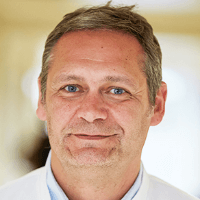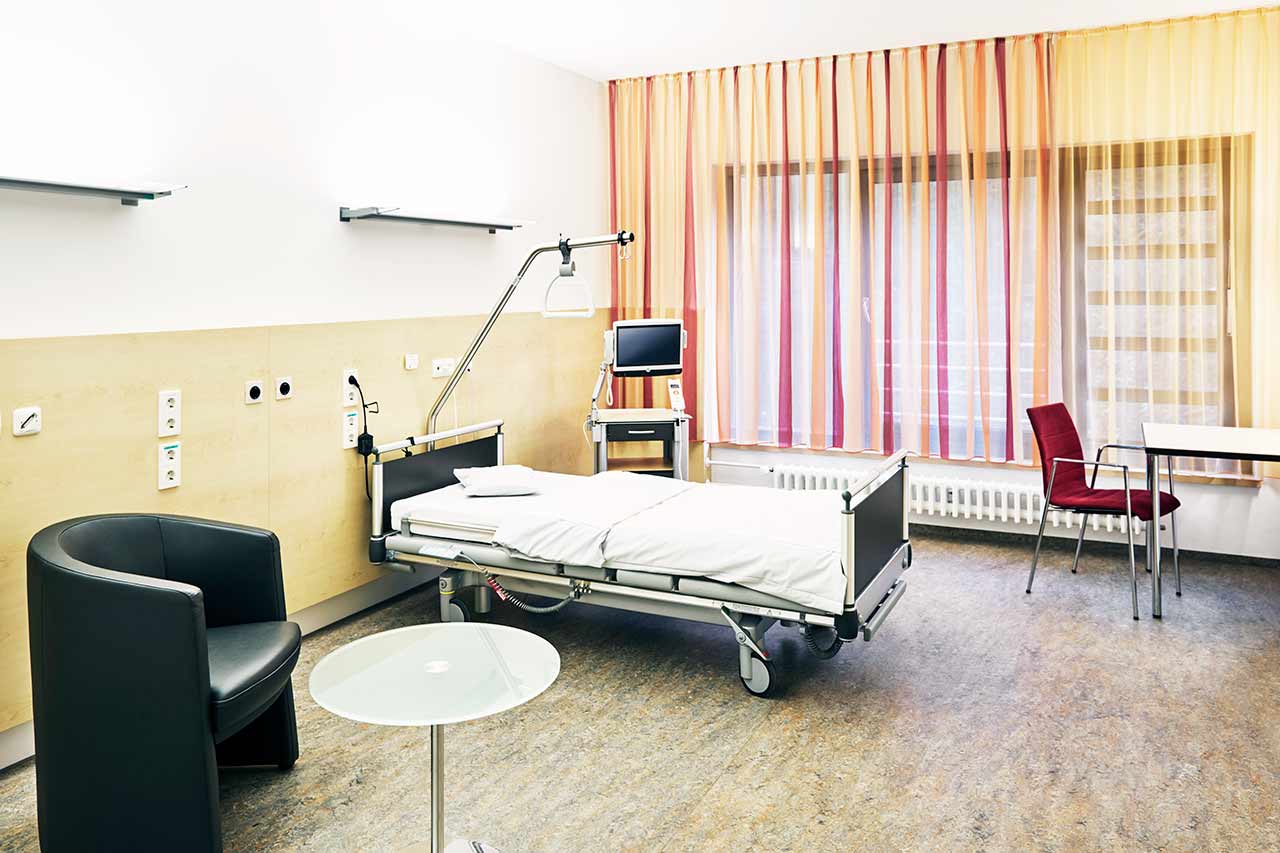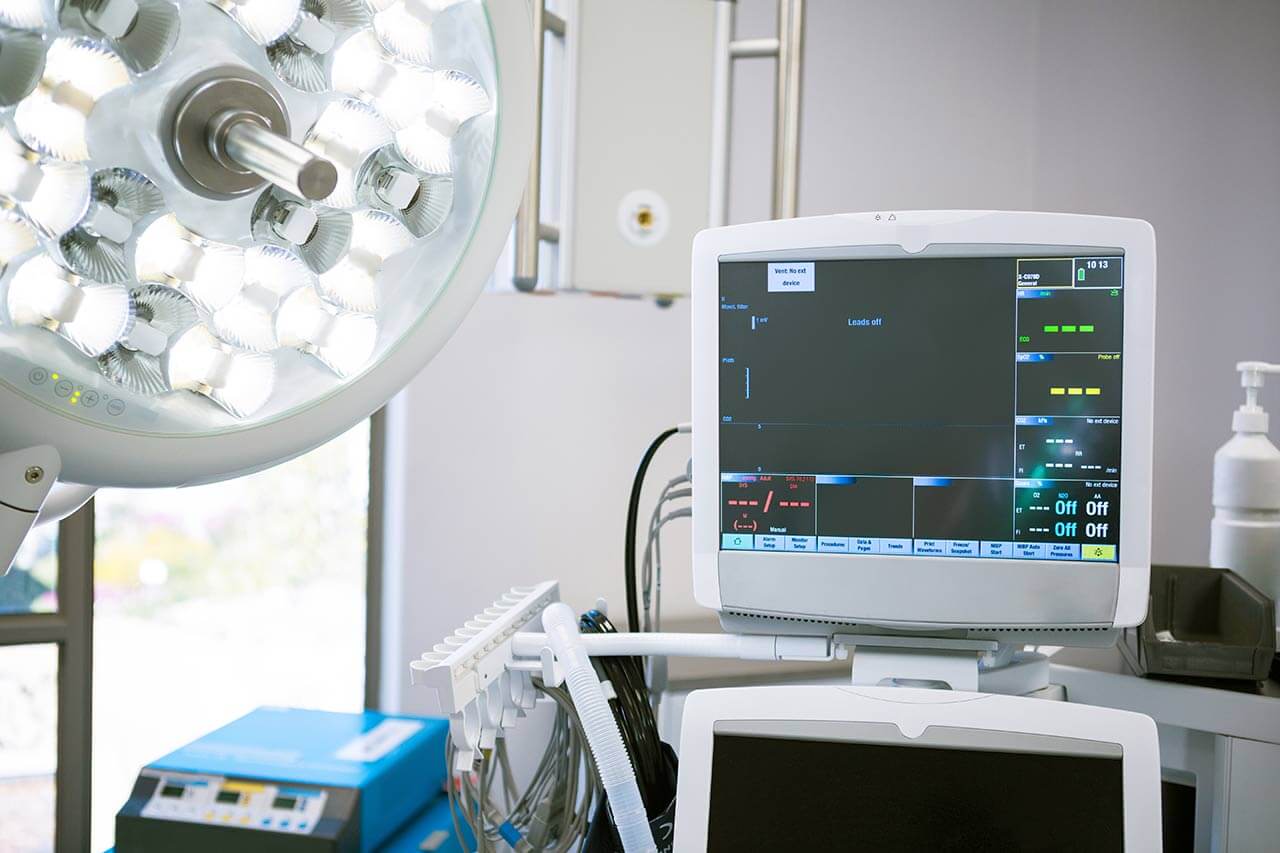
About the Department of Adult and Pediatric General and Abdominal Surgery, Hepatopancreatobiliary Surgery, Hernia Surgery, Endocrine Surgery, Thoracic Surgery, Vascular Surgery and Bariatric Surgery at Hospital Oberberg Gummersbach
The Department of Adult and Pediatric General and Abdominal Surgery, Hepatopancreatobiliary Surgery, Hernia Surgery, Endocrine Surgery, Thoracic Surgery, Vascular Surgery and Bariatric Surgery at the Hospital Oberberg Gummersbach performs the full range of surgical interventions for diseases of the stomach, esophagus, colon, pancreas, liver, gallbladder, bile ducts, thyroid, parathyroid glands, and adrenal glands. The department has a highly qualified team of thoracic surgeons who are responsible for performing surgical procedures for lung, mediastinal, pleural, and thymic pathologies. Patients with vascular diseases are also operated on here. A specially trained team of surgeons performs bariatric operations to treat morbid obesity. Of particular interest to the department's specialists is the surgical resection of gastrointestinal malignancies and lung tumors. Pediatric surgeons most commonly perform operations for hernias, phimosis, and appendicitis. The department has 75 beds for inpatients. However, minor interventions are performed on an outpatient basis. More than 2,200 surgical interventions of varying complexity are performed in the department annually, which testifies to the rich clinical experience of the surgeons.
The department is headed by Prof. Dr. med. Stefan Saad. He is a highly qualified surgeon with more than 20 years of experience, during which he has successfully worked with the most complex clinical cases. Prof. Stefan Saad manages a professional team of specialists consisting of three senior physicians, four surgeons, four assistant physicians, and competent nursing staff.
The primary focus of the department's team of general and abdominal surgeons is the treatment of stomach and colon malignancies. Patients with these types of cancers receive interdisciplinary medical care because only such an approach ensures good results. A treatment regimen is elaborated on an individual basis at the tumor board with the participation of surgeons, gastroenterologists, oncologists, radiation therapists, radiologists, and other specialists. The diagnostic stage involves laboratory tests, gastroscopy (if stomach cancer is suspected), colonoscopy (if colon cancer is suspected), computed tomography, magnetic resonance imaging, and other examinations. The first-line treatment is the surgical removal of the malignant neoplasm. In the early stages of cancer, clinicians can often avoid open surgery. Instead, they perform sparing endoscopic treatments. Patients with stomach cancer undergo endoscopic mucosal resection, and patients with colon cancer undergo polypectomy during colonoscopy (the presence of polyps in the colon is a precancerous condition with a high risk of developing cancer). The second-line surgical treatment for stomach cancer is stomach resection, or a gastrectomy, which is the surgical removal of the stomach. The department's surgeons strive to preserve part of the organ, if possible. In the advanced stages of colon cancer, the specialists perform a colectomy (surgery to remove part or the entire colon). The extent of the operation, however, depends on the prevalence of the cancer process.
It is important that the majority of operations for stomach and colon cancers are performed in the department using minimally invasive techniques, due to which the postoperative pain becomes minimal and the risks of severe bleeding or postoperative complications are practically equal to zero. Such operations allow patients to return to their normal lives as quickly as possible without long-term rehabilitation.
The department's team of surgeons also regularly performs hernia repair surgery. The specialists treat inguinal, umbilical, and incisional hernias. The only effective treatment method for hernias is surgery. The department brilliantly performs hernioplasty, which involves the excision of the hernia with follow-up strengthening of the hernia gates with a special mesh implant. Such operations are currently the "gold standard" of hernia treatment. Surgical interventions of this kind are performed in the department using sparing minimally invasive techniques, so the patient leaves the hospital 1-2 days after surgery, while surgical risks are also almost absent.
The department also offers top-class services in thoracic surgery. The specialists in this field are responsible for endoscopic procedures (mediastinoscopy and thoracoscopy), minimally invasive operations for the removal of malignant lung tumors and lung metastases, and operations for pneumothorax, pleural empyema, and other respiratory diseases. Of particular interest is the surgical resection of malignant lung tumors. Lung cancer is one of the most common and aggressive types of oncology worldwide. In most cases, surgery is the primary method of combating lung cancer, the extent of which depends on the stage of the cancer process. With appropriate clinical indications, the department's specialists perform segmental resection (removal of a lung segment) or lobectomy (removal of a lung lobe). In complex cases, a total lung removal surgery (pneumonectomy) may be required. The decision on the optimal type of surgical intervention for the patient is made based on the size of the tumor, its location, the type of lung cancer (small cell or non-small cell), the spread of the cancer process, and other factors.
It is worth noting that in many cases, the department's surgeons manage to perform lung surgery using minimally traumatic video-assisted thoracoscopic surgery (VATS). VATS begins with making 2-3 incisions, each about 2 cm in size, on the chest for inserting special surgical instruments. The main tool for the surgeon is the thoracoscope, which has an attached tiny camera and light source. The camera transmits real-time scans of the surgical field on a large screen with multiple zooms. The surgeon, guided by these scans, performs the necessary manipulations step-by-step and sutures the wound. Video-assisted thoracoscopic surgery is performed without a thoracotomy, which greatly simplifies and accelerates the process of patient recovery in the postoperative period. In addition, such operations guarantee an excellent aesthetic result. And what is more, their effectiveness is not inferior to classical ones.
The department's main clinical focuses include the following:
- General and abdominal surgery
- Surgery for malignant gastrointestinal diseases, with a special focus on colon and stomach cancer treatment
- Surgery for appendix removal
- Surgery spleen removal
- Surgery for gastroesophageal reflux disease
- Surgery for pancreatitis
- Surgery for appendicitis, hernias, and phimosis in children
- Hernia surgery
- Surgery for inguinal hernias
- Surgery for umbilical hernias
- Surgery for epigastric hernias
- Surgery for incisional hernias
- Hepatopancreatobiliary surgery
- Surgery for benign and malignant tumors of the liver, gallbladder, and bile ducts
- Surgery for cholecystitis
- Surgery for bile duct strictures
- Endocrine surgery
- Surgery for thyroid diseases
- Surgery for parathyroid diseases
- Surgery for adrenal diseases
- Thoracic surgery
- Mediastinoscopy
- Thoracoscopy
- Surgery for lung cancer
- Surgery for pneumothorax
- Surgery for pleural empyema
- Vascular surgery
- Surgery for carotid artery stenosis
- Surgery for abdominal and thoracic aortic aneurysms
- Surgery for occlusive peripheral arterial disease
- Surgery for deep vein thrombosis
- Surgery for varicose veins
- Surgery for leg ulcers
- Bariatric surgery
- Gastric banding
- Gastric bypass surgery
- Sleeve gastrectomy
- Biliopancreatic diversion
- Other medical services
Curriculum vitae
Prof. Stefan Saad studied medicine, along with politics, history, and philosophy, at the Universities of Aachen and Cologne. In 1986, he received his medical license. In 1989, after successfully defending his doctoral thesis and receiving the university prize for the best thesis, he was appointed as an Assistant Physician at the Hospital Cologne-Merheim. After a two-year stay in Japan, Dr. med. Saad returned to Merheim in 1998. In 2001, he became an Assistant Professor and received his Venia Legendi. He is currently the Head Physician in the Department of Adult and Pediatric General and Abdominal Surgery, Hepatopancreatobiliary Surgery, Hernia Surgery, Endocrine Surgery, Thoracic Surgery, Vascular Surgery and Bariatric Surgery at the Hospital Oberberg Gummersbach. The specialist is particularly experienced in minimally invasive surgery and morbid obesity treatment. In addition, the main clinical interest of Prof. Stefan Saad is cancer surgery.
Photo of the doctor: (c) Klinikum Oberberg GmbH





